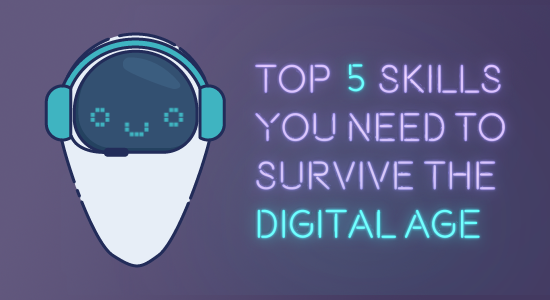65 percent of children now entering primary school will hold jobs that currently don’t exist.
This means that future jobs will look vastly different by the time they graduate. Research indicates that by 2025, we will lose over 5 million jobs to automation. While machines and robots become smarter and capable at fulfilling logic-based tasks, they may not be able to match our level of creativity or critical thinking. The new artificial intelligence revolution will change what it means to be employable.
Here are the top 5 skills you need for the digital age:
1. Emotional intelligence
Let’s start by defining what emotional intelligence is. Emotional intelligence is the ability to understand and manage your own emotions and those of the people around you. Intelligent machines can identify problems and offer solutions but we need emotionally intelligent people to motivate a team, boost morale and interact with others. Emotional intelligence is necessary to collaborate with others in an increasingly complex work environment. Many companies are also moving away from merely relying on functional excellence such as having good educational qualifications to seeking out employees with good emotional intelligence traits such as empathy and humility. Leaders need to possess emotional intelligence so that they can manage employees better during times of uncertainty.
2. Cultural intelligence
We are increasingly working in a globally diverse work environment. How you interact with colleagues working in different countries can vary greatly due to cultural norms. Do you know how to present a business card in India? When is a tweet considered sensitive? Cultural intelligence is the ability to cross boundaries and thrive in various cultures. In a global world where problems cross borders, we need leaders who can communicate effectively and build diverse networks to solve messy problems. We need to experience and learn about other cultures and develop cross-cultural empathy while engaging and connecting with peoples from different cultures. Embracing and flourishing in diversity will be a key criteria for success in the near future.
3. Geek acumen
None of us can afford to say “I am not a tech person” in this day and age. Smartphone technology and adoption has grown rapidly in the past few years and most of us are being inundated by emerging technologies such as chatbots, intelligent apps and virtual reality. Having geek acumen means keeping yourself up-to-date with new technologies and trends in your immediate expertise area and also in the broader domains.
For instance, if you are working in the in communications industry, you need to be aware of trends in using chatbots for customer service and also how data analytics can be applied to provide enriching content to engage your customers. It is simply not enough to be aware of current trends, but you will need to know how best to apply them to your business.
4. Virtual collaboration
No one wants to sit in meetings all day, especially if they don’t feel productive. In fact, executives consider more than 67 percent of meetings a failure. We live in a digital age and virtual collaboration are here to connect and help us make the most of our time at work. Learning to work with clients and colleagues who are scattered around the world in various time zones is made possible with the help of digital tools in conferencing. Do you know how to initiate and host a video conference call? Do you know how to share knowledge virtually? With virtual collaboration, you can work from anywhere such as your home or a café. Nearly all jobs will have some component that will be done virtually. Do you have the necessary skills to set up a virtual meeting for success?
5. Critical problem-solving
One word to sum up the future is uncertainty. We do not know how technology will change or how jobs will look like in the next 10 years. Our ability to adapt in new situations require us to analyse problems and approach them from a critical approach. Yesterday’s problem-solving skills will not be the same as tomorrow. Traditional problem solving follows a linear process where it involves identifying the problem, collecting data before making a decision. In a world shaped by artificial intelligence, those that can adapt to any situation and tackle issues with critical thinking skills will be valued over others. It proves to others that in an uncertain world, you can think clearly in unclear situations. If automation is becoming prevalent, the kind of jobs that will increase will be those that cannot be done by machines and critical thinking skills will definitely be in demand.
Are you ready for the digital age? Click here to talk with our chatbot now!
We hope that this article is helpful. Do you have any tips you would like to add?
Let us know in the comments and please share this post with a friend/colleague if you enjoyed it!
